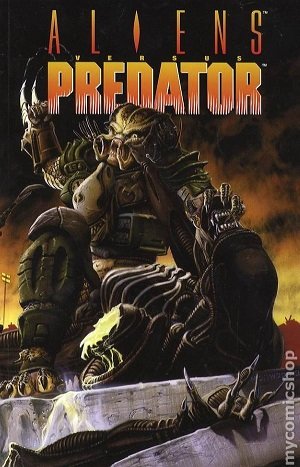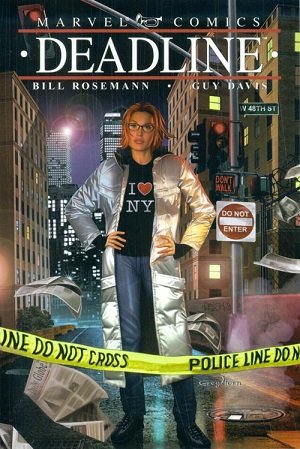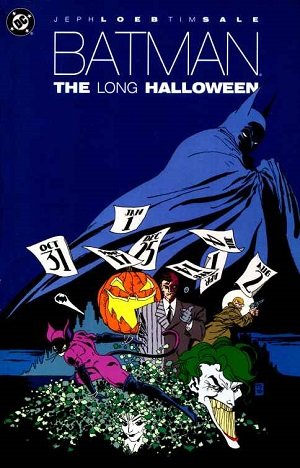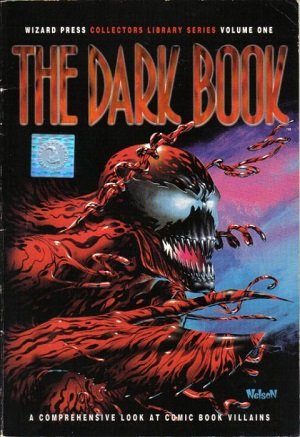The single largest barrier to entering the comics hobby as far as I can tell isn't the amount of space you have available to store those long boxes, it's actually the amount of information people think they need to acquire in order to truly understand comics. And it's kind of true -- if you want to participate in the hobby in a significant way, if you want to build a truly epic basement temple dedicated to the awesomeness of stories told with sequential artwork, if you want to hold your own in conversations that take place on comic forums, then yeah, you will find yourself hurled into the deep end without a life jacket on the assumption that not only can you swim, but you can also breathe underwater.
For a certain type of person, that's just what they're looking for: that merit badge declaring they're part of an elite fandom, not some clueless norm. And that's totally cool! Comics need their super-fans and evangelists, the ones willing to pull out their wallets week after week. But the best thing about comics is that, unlike other fandoms, the so-called "weekend warriors" are just as welcome (at least around this Steemian).
So whether you're the dictionary definition of the clueless newbie, a budding fan who'd like to know more, someone who left the hobby for a few years because life happened, or a grognard wondering what the hell this glasses-wearing, energy-drink-sipping, essay-writing nerd could possibly say about comics, I want to welcome you into the fold. This hobby's amazing, but if you dive right in you risk getting lost, getting burnt out, or getting frustrated. So here are a few friendly suggestions of books that are easy to find, cheap to collect, require no previous character or universe knowledge to understand, and can be enjoyed by just about anybody.
And just to make it more interesting, I'm going to ignore Watchmen and The Dark Knight Returns. Everybody talks about them, everybody recommends them, so I'll go against the grain and offer up some alternatives.
Aliens vs. Predator (1991, Dark Horse Comics)

Randy Stradley knew there was gold in them there hills from the moment he heard those three words at a company roundtable discussion about ideas for upcoming books. In hindsight, of course, it makes perfect sense: the pairing's appeared in video games, feature films, novels, comic books (of course) and even a collectible card game which is surprisingly deep and enjoyable to play. In 1990, however, no one was certain how, or even if, it could be done. The Predators are consummate hunters, always on the lookout for the perfect prey. What could be more difficult than challenging a species which has evolved to the pinnacle of survival, combat, and reproduction? Image the challenge! Imagine the honor! Imagine the disaster befalling anyone unlucky enough to get caught in the middle.
Aliens vs. Predator tells the story of the doomed colonists of Ryushi, a desert-like frontier world where a bunch of rough-and-tumble ranchers eke out a hardscrabble existence herding beasts called Rynth (think of a cross between a rhinoceros and a cow) under the watchful protection and intrusive bureaucracy of their Corporate counterparts. In the interest of creating the ultimate hunting safari, a group of Predator warriors have captured an Alien Queen. Using her eggs, they inseminate Ryushi with dozens of Alien offspring, offering up the perfect place to earn a warrior's honor or a warrior's death. The Predators are unaware of the human presence on Ryushi, while the humans are taken off-guard by the sudden illness and general lethargy sweeping the Rynth herds. Once the Alien menace erupts, the colonists find themselves caught between certain death at the hands of the biomechanical nightmares, and certain death at the hands of the monsters who've come to hunt them.
If your only experience with these two properties under the same banner is the eye-gougingly awful films Alien vs. Predator and Aliens vs. Predator: Requiem, then you don't know what you're missing. Aliens vs. Predator proved there was such a thing as a crossover with great art, a great story, and zero barrier to entry since the Predator and Aliens are easily recognizable parts of the pop culture lexicon. By focusing on the humans caught up in the worst pincer attack since that crawdad grabbed your testicles, Dark Horse makes the struggle one of survival instead of a simple test of brute combat, but if you came solely for the ass kicking, don't worry--there's plenty and to spare once the Predators get into it with the unstoppable black wave of death. It's Aliens without the Colonial Marines, Predator without Dutch, and if you can stand some blood and guts, one of the most entertaining slobberknockers ever committed to the four-color printing process.
Tracking down the individual issues isn't difficult, but Aliens vs. Predator has been reprinted and collected so many times in so many different formats, from a softcover trade paperback, to a hardcover collector's edition, to an omnibus graphic novel that contains additional stories, that you can add this gem to your collection for around seven dollars. It's worth every penny.
Deadline (2002, Marvel Comics)

When we read superhero comics, we generally see the story unfold through their eyes. The Justice League, the Avengers, the X-Men -- whatever they're fighting, whatever they're doing, we're getting the stories from their perspectives. They're the focus, they're why we buy the book.
This four-part miniseries from Marvel starts with a simple premise: what does it look like from the other side of the page, so to speak? The world belongs to the common, ordinary folks working their 9-5 jobs, tending their families, balancing their relationships, dropping their kids off with grandma. When the Fantastic Four show up, it's another exciting extravaganza for them and the lucky readers. It's awesome! For the people just trying to make their way through a typical day in the big city though, it might be the exact opposite: streets are closed, public transportation shuts down, police and emergency services clog the avenues, and clean-up operations threaten to bankrupt insurance companies. If you're just trying to pick up your kid from school, the last thing you want to see is Spider-man and Green Goblin throwing down on the 79th Street bridge.
Deadline follows Kat Farrell, a reporter for the Daily Bugle, as she goes about her life trying her best to avoid the 'capes' and the chaos that follows in their wake whenever they show up. Of course, her assignment is the superhero beat, so when she stumbles into the middle of a murder investigation involving a dead man coming back to life, "thrilled" is not the way she'd describe it.
Writer Bill Rosemann scripts a story underscoring that life for ordinary folks among super-powered beings and literal gods isn't as exciting as the comics make it out to be, giving a human-focused slant to life in Marvel's Big Apple, with a lesson that you don't have to be able to throw fireballs or fly at supersonic speeds to be a hero. This is one book where the big players are bit players, and you don't need any previous knowledge of the Marvel universe to enjoy the story. The four issues were collected into a 96-page trade paperback which sells for under five dollars, making it a perfect first step for people with no comic knowledge to get acquainted with the form.
Batman: The Long Halloween (1996, DC Comics)

Jeph Loeb and Tim Sale dropped this thirteen-issue miniseries on unsuspecting Bat-fans in 1996, and two decades later it's still considered one of the greatest Batman story arcs of all time. Best of all, even if you don't know anything at all about Gotham City, the story's easy to follow as it's essentially a long-running mystery where culturally-familiar faces like Joker, Catwoman, Poison Ivy, and Two-Face feature, but they're playing second-fiddle to a new villain known as Holiday.
No one knows the identity of this vigilante, but somebody in the powerful Falcone mob family must have pissed him off, because he's murdering his way through the Falcone family tree one branch at a time. His ultimate target appears to be head boss Carmine 'The Roman' Falcone, a name which should be familiar to viewers of the television show Gotham.
Who Holiday is, and why he's targeting the mobsters, are the main questions, but Loeb takes a full year of time (each issue is named for a holiday occurring during that particular month when Holiday strikes) to play out the story. Batman's not the only one hunting for Holiday either: Joker's not laughing that somebody's upstaging him, The Riddler's curious about this enigmatic figure dropping puzzles even he can't solve, The Scarecrow's not about to let a new face terrify the populace better than he can, and the Mad Hatter's keen to use the distractions as an opportunity to make some extra money by robbing the local bank.
Thirteen months of chaos, anarchy, twists, and double-crosses starring some of the most iconic characters in the Batman universe, and a killer whose identity doesn't rely on previous reader knowledge to unmask. This one's been reprinted so many times it's ridiculous, making it easy to find and inexpensive to boot.
The Dark Book (1994, Wizard Press)

Not exactly a comic, but an excellent resource and reference for new and old readers alike, The Dark Book is Wizard's guide to everything villainous in the funny books. Published in 1994 it's missing information on anything remotely current, but it's a phenomenal guide to catching up on who some of the most iconic bad guys in comics history are, how they came about, and their major interactions with both heroes and other villains. From the Golden Age to the Modern Age, Lex Luthor to Doomsday, Green Goblin to Hobgoblin, Joker to Bane, they're all here.
The book's broken down into numerous sections, all dealing with the worst of the worst. Whether you want to learn about villainous team-ups, the nastiest monsters to grace the page, the best anti-heroes, the times when bad guys turned over a new leaf, the gizmos and gadgets they use to make life miserable for heroes, or even the most awesome supervillain vs. supervillain smackdowns, The Dark Book is a 128-page (and one poster) tribute to the reasons the good guys get up in the morning and the reasons they can't retire.
Aside from an updated version released in 1998, this is the best and most inexpensive way to boost your knowledge of comic book history in short, digestible bits. I've seen nothing like it since (trolling through the Internet reading Wikipedia articles is, of course free), and would recommend it to anyone who wants a look at the darker side of the costumed spectrum. It naturally pays much more attention to Marvel and DC than other studios, but the occasional indie studio creations like James O'Barr's The Crow crop up, so it's not solely dedicated to the Big Two. And like everything else on this list, it's dirt cheap.
But let's not make this just about me. If you blog on comics, if you're a long-time fan or first-time reader, and you have suggestions for easy-to-find and inexpensive entries like those on this list, throw those suggestions out there, either in the comments here or on your own Steemit page (drop a link when you've published your own list). Remember, the idea is that readers don't have to read 150+ issues of something in order to enjoy or understand it, so steer clear of things like The Walking Dead which require a huge investment of time if not cash, to get into, or books that are great stories but run expensive on the secondhand market.
Let's do this, gang. @cryplectibles, @saywha, @thebeesknees, @methus, @steven.nam, @blewitt, @pencilandink ...get in here and do your things. Let's make new readers and pull some older ones back into the fold.
